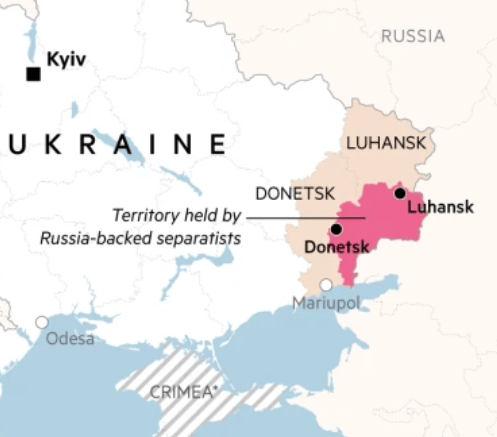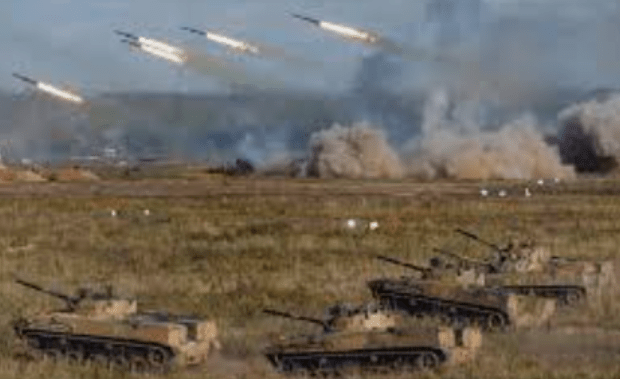
Russia and Ukraine on the brink of a war in the interests of neither population
By John Pickard
As we publish this article, Ukraine and Russia appear to be on the brink of war, brought on by a large-scale Russian invasion. It would be a war that would lead to thousands of military casualties on both sides and potentially tens of thousands of civilian deaths. These factors alone would devastate the Ukrainian economy and set back the workers’ movement for years.
Russian military forces have entered the self-declared ‘independent’ regions in the South West of Ukraine, after annexing them to the Russian state. Bearing in mind that the separatist regions of Luhansk and Donetsk form only part of those administrative regions of Ukraine, clashes in this area may become the pretext for a wider invasion by Russia.
In the event that it takes place, socialists would unequivocally condemn any Russian invasion of Ukraine, whatever the pretext used. It would have devastating economic and social consequences for the working class of both countries, but particularly Ukraine itself. It would be a military adventure launched for the prestige and geo-strategic military objectives of the Kremlin, and not in the least for the benefit of ethnic Russians in the East or South of Ukraine.
Putin’s over-riding concern, as always, is for preserving his own power and that of the ruling clique around him. Emphasizing the historic links between Russian and Ukraine, his TV address (above, BBC news picture) to the Russian people sounded like a justification to the Russian people for war that they will pay for. It seems to be Putin’s calculation that a war for Ukraine will enhance his position at home and distract attention from the precariousness of day-to-day life of the mass of the population.

Russia is a mafia state, a peculiar aberration of capitalism. Power is shared between economically powerful billionaires, the ‘oligarchs’ who were enriched by the theft of state assets in the Yeltsin years, and an even more powerful cabal around Putin and the United Russia Party. This is a regime that fixes elections, harasses, arrests and even murders prominent opponents, and has nothing in common with any socialist traditions from that country’s past.
War will undermine the precarious living standards of Russian workers
In Russia, in the event of an invasion of Ukraine, the cost of the war and not least the casualties, on top of the expected economic sanctions imposed by the West, will dramatically undermine the already low living standards of the mass of workers. Although in the short-term a war may lead to increased support for Putin and his United Russia party, in the longer run a war will undermine him, as the ten-year long war in Afghanistan undermined Gorbachev.

Ukraine, like Russia, is dominated by rich and powerful oligarchs, who misuse the political processes for their own profit and power. Since the so-called Euro-Maidan movement of 2013-14, extreme right-wing nationalist parties and militias have been at the centre of Ukrainian politics and the organised workers’ movement has been largely sidelined.
It has been as a result of the influence of such right-wing nationalist groups that the status of Russian as an official language at state level was removed and the population of the East and South further alienated from Kyiv. Russian is now the largest minority language without state recognition anywhere in Europe.
Notwithstanding the prominence of right-wing nationalist groups in Ukraine, socialists have to acknowledge the long-standing historical struggle for Ukrainian independence that has been supported by a majority, excepting, perhaps, a relatively short interval in the years immediately after the October revolution (see article here).
Stalinism was particularly harsh in Ukraine
The historical domination of Ukraine by a Stalinised Soviet regime was characterized by Great-Russian chauvinism, and it included two devastating (and avoidable) famines, in 1932 and 1946, in which millions died. In both cases it was as a result of brutal, forced collectivization and seizures of food, a policy dictated from Moscow without any reference to the needs of the Ukrainian rural community.
These events have left deep scars within Ukrainian political traditions. There is even a specific memorial day, the Holodomor, which commemorates the famine in the 1930s. It was no accident that in some of his last writings, Trotsky, who was born and brought up in Ukraine, called not for the “right of self-determination” for Ukraine, but for separation, for an “independent socialist Ukraine”.

We also need to recognise that there are historic, ethnic and political differences between Western and Central Ukraine and the regions to the South and the East, where the Russian language is more prevalent. We would argue, however, that a socialist Ukraine, based on genuine workers’ democracy, would accommodate the needs of all minority languages, including Russian.
Lies used by NATO to justify the 2003 war in Iraq
We would also argue that in the context of a socialist federation of eastern European states there could be agreed borders that consider different ethnic traditions and history, and the wishes of the populations. Whether Crimea or the break-away regions of the Donbas should be independent of Ukraine or Russia, or both, is ultimately an issue that should be decided by the people of those regions.
Whilst socialists should condemn a Russian invasion, that cannot be based in the slightest on the polices and interests of the Western capitalist powers and NATO, an organisation was set up as the military arm of the bigger imperialist powers, especially the united States. NATO has never been a force for ‘democracy and peace’ but has historically included dictatorships, as in Spain, Portugal and Greece, that have murdered their own oppositionists. NATO’s expansion into some of the former states of the USSR has been done to enhance the interests of Western capitalism, and for that reason alone, but it has become Putin’s pretext for his threats to Ukraine.
Always in war, the first casualty is Truth, and we should give no credence whatsoever to the pronouncements of the likes of Biden, Johnson and Macron or the mainstream media which in foreign policy matters are merely their megaphones. We have not forgotten the lies that were used by George Bush and Tony Blair, including detailed maps and ‘intelligence’, that were presented to the UN, and used to ‘justify’ the devastating invasion of Iraq in 2003. That invasion led to the rise of ISIS and to a devastated Iraq becoming the failed state it is today.
Labour indistinguishable from Tories on this issue
A war in Ukraine may only last a short time in terms of conventional military operations, but its significance will reverberate down the years. It may lead to protracted guerrilla operations and a terrorist campaign by Ukrainian partisans and nationalist organisations. Either way, it will throw the workers’ movement back in both Ukraine and Russia.

To an extent it will also damage the interests of workers in Western Europe and the USA, by emphasizing the ‘national’ interests of the Western states and the ‘necessity’ of NATO and arms expenditures, at the expense of pressing class issues. But in the long run, it will lead to anger and resentment in Russia and pressure for some settlement, as it will only increase the movement in Ukraine for genuine independence.
We should note that on this issue the Labour leadership are completely indistinguishable from the Tories, as mouthpieces of British capitalism and supporters of NATO. We should utterly condemn this as yet one more example of the shift of the Labour party towards Tory-lite policies.
On the other hand, whilst understanding the sympathies of ‘peace’ movements and groups like the Stop the War Coalition, we do not believe that appeals to ‘reason’ and moral appeals ‘for peace’ have any meaning or value. We are not in a cosy debate about intellectual and moral arguments; the labour movement is fighting tooth and nail against the leaders of societies that are based on power, prestige and profit. We are dealing with a geo-political framework dominated by pro-capitalist, anti-democratic and autocratic governments who will follow policies only in their own narrow national interests.
We should call on the international labour and trade union movement, therefore, to oppose an invasion and war, if it should happen, not from a moral standpoint, but from the standpoint of what is in the interests of the working class. We should call for workers to boycott the manufacture, sale and transportation of armaments to this region and internationally. We believe that the only road to genuine peace is through the struggle for fundamental socialist change and for a Socialist Federation of European states.
No comments:
Post a Comment